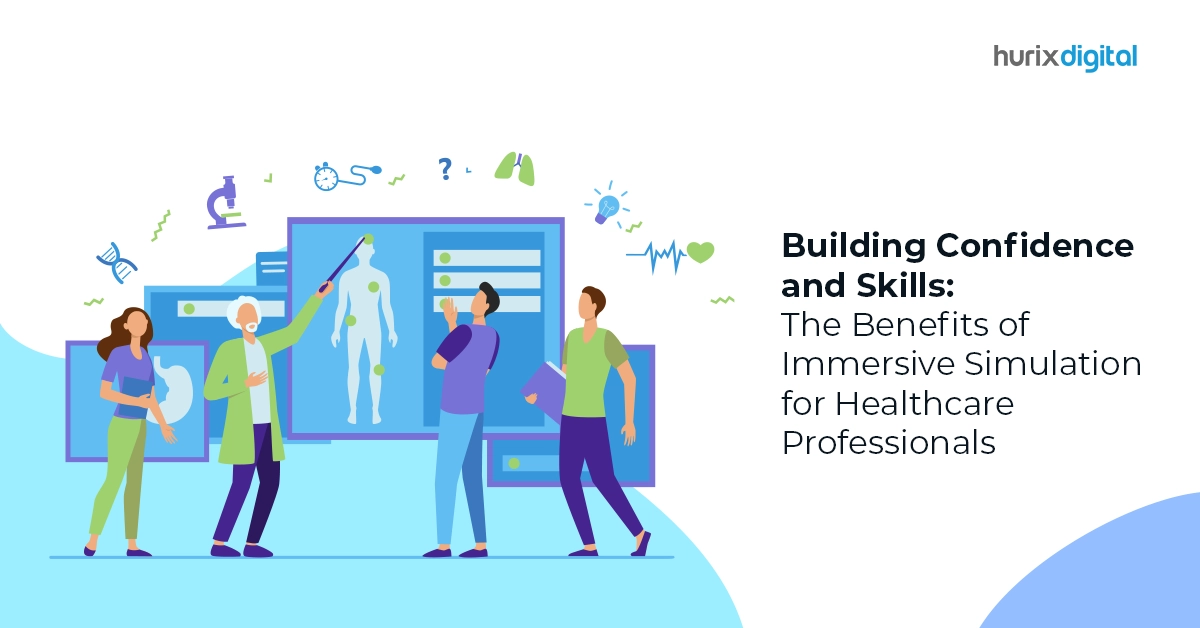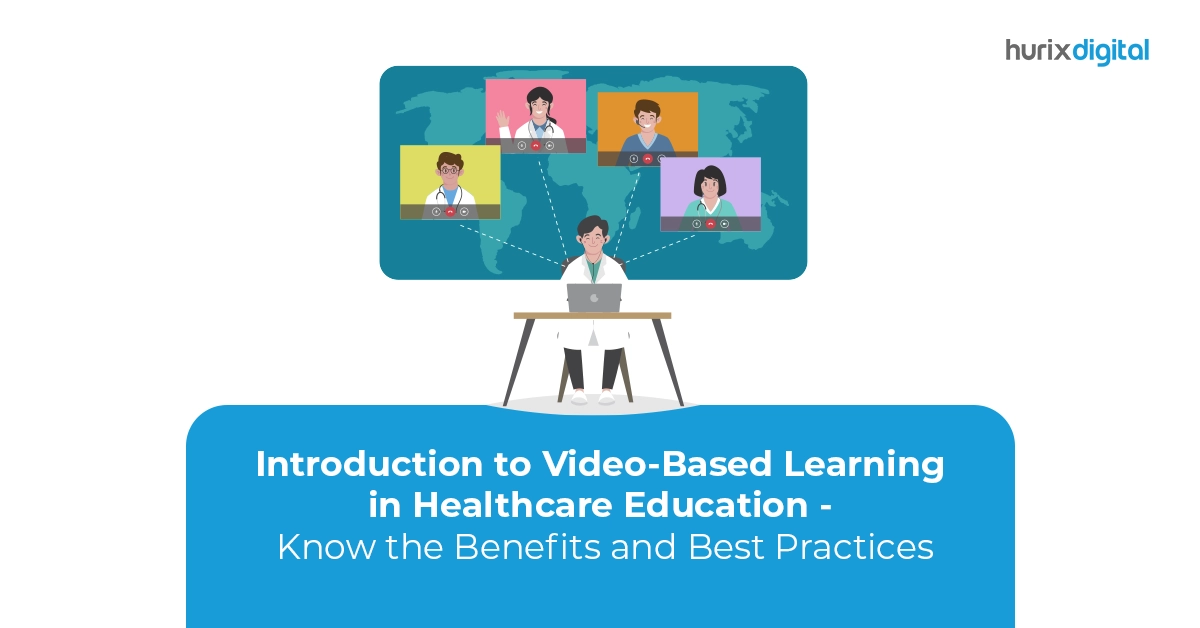
Building Confidence and Skills: The Benefits of Immersive Simulation for Healthcare Professionals
Summary
Learn how immersive simulations can boost confidence and skills among healthcare professionals. This blog discusses the advantages of using simulations for training and development.
The future of healthcare training lies in embracing innovative technologies like immersive simulation. VR and AR offer a powerful toolkit for creating engaging, interactive, and personalized learning experiences. The global market share for VR-based learning is forecasted to reach $123.87 billion by 2030 at a CAGR of 27.99%.
As these technologies continue to evolve and become more affordable, we can expect them to play an increasingly vital role in equipping healthcare professionals with the skills and confidence they need to deliver exceptional patient care.
Here, we explore the benefits of immersive simulation for healthcare professionals and understand how Virtual Reality (VR) and Augmented Reality (AR) technologies are transforming medical education.
Table of Contents:
- The Need for Effective and Engaging Training Methods
- Immersive Simulation: A Game-Changer in Healthcare Education
- Benefits of Immersive Simulation for Healthcare Professionals
- In Conclusion
The Need for Effective and Engaging Training Methods
The healthcare industry faces a growing demand for skilled professionals who can deliver high-quality care in increasingly complex environments. According to a 2022 report by the Association of American Medical Colleges (AAMC), the United States alone will face a shortage of up to 139,000 physicians by 2033.
This necessitates effective and engaging training methods that can equip healthcare professionals with the necessary skills and knowledge to meet these evolving challenges. Medical knowledge is expanding rapidly, and healthcare professionals need to stay abreast of the latest advancements and best practices.
Limitations of Traditional Training Approaches
While traditional training methods like lectures, textbooks, and standardized tests play a crucial role in healthcare education, they often fall short of providing the practical experience needed to thrive in real-world clinical settings.
These limitations can lead to knowledge gaps and a lack of confidence in applying learned concepts to practical scenarios. Here are some challenges associated with traditional healthcare training:
- Limited access to real-world scenarios: Recreating complex medical situations in a classroom setting can be difficult and impractical.
- Risk of errors during hands-on training: Trainees practicing procedures on real patients can lead to potential harm.
- Difficulty replicating the pressure and decision-making of real-world situations.
- Challenges in tailoring training to individual learning styles.
Also Read: Applications of Large Language Models (LLMs) in Healthcare
Immersive Simulation: A Game-Changer in Healthcare Education
The immersive simulation utilizes cutting-edge technologies like VR and AR to create realistic and interactive training environments. These environments allow healthcare professionals to practice procedures, manage complex medical situations, and make critical decisions in a safe, controlled setting.
Research shows evidence that VR simulation training improved surgical skills and instilled confidence in trainees compared to traditional methods.
VR and AR Technologies in Healthcare Training
- Virtual Reality (VR): VR technology creates a completely immersive virtual environment where healthcare professionals can interact with simulated patients, medical equipment, and clinical scenarios.
- Augmented Reality (AR): AR technology overlays digital information onto the real world. In healthcare training, AR allows users to visualize anatomical structures, practice procedures on virtual models superimposed on physical mannequins, or receive real-time feedback during simulations.
Benefits of Immersive Simulation for Healthcare Professionals
The effectiveness of healthcare simulation technology training is clearly outlined in the benefits listed below:
1. Enhancing Experiential Learning and Skill Development:
Immersive simulation offers a unique opportunity for experiential learning, enabling healthcare professionals to practice skills in a safe and controlled environment. This hands-on approach fosters deeper understanding, improves muscle memory, and facilitates the development of critical technical skills.
VR and AR simulations place healthcare professionals in realistic clinical environments, allowing them to practice procedures, manage complex situations, and make critical decisions – all within a safe, controlled setting.
2. Promoting Scenario-Based Learning and Decision-Making
Healthcare professionals can be exposed to a wide range of realistic scenarios through immersive simulations. These scenarios can be tailored to specific specialties and learning objectives, enabling participants to practice decision-making skills, communication strategies, and crisis management in a simulated environment.
Immersive simulation scenarios can be designed to focus on communication and collaboration within a healthcare team. By practicing teamwork in a simulated surgical setting, healthcare professionals can develop effective communication strategies and refine their ability to work cohesively as a unit.
3. Building Confidence and Reducing Stress in High-Pressure Situations
Immersive simulation allows healthcare professionals to practice procedures and manage complex situations in a risk-free environment, helping build confidence and reduce stress. This translates into improved performance and better patient outcomes when faced with similar situations in real-world clinical settings.
The realistic and interactive nature of immersive simulations helps healthcare professionals build confidence in their abilities. They can develop the composure and critical thinking skills necessary for success in real-world situations.
4. Improving Patient Safety through Risk-Free Training
Traditional training methods often involve practicing procedures on mannequins or standardized patients. Immersive simulation offers a safer alternative, allowing healthcare professionals to make mistakes and learn from them without jeopardizing patient safety.
Immersive simulations provide a safe space for healthcare professionals to practice high-risk procedures and hone their skills without the risk of harming real patients. This helps trainees gain valuable experience in identifying and managing medical emergencies, performing complex surgeries, and administering delicate treatments.
5. Enhancing Accessibility and Scalability of Healthcare Training
Immersive simulation offers a scalable and accessible approach to healthcare training. VR and AR simulations can be easily deployed across various locations, allowing healthcare professionals to access training opportunities regardless of geographical constraints.
VR and AR training modules can be easily distributed and accessed by healthcare professionals at their convenience, regardless of location. Additionally, immersive simulation programs can be readily scaled to accommodate larger training groups, making them a cost-effective solution in the long run.
Also Read: Training Healthcare Professionals on Accessibility and Inclusivity
In Conclusion
Healthcare simulation benefits are transforming the training settings. By offering a safe, engaging, and realistic learning environment, VR and AR technologies are empowering healthcare professionals to develop the skills and confidence they need to deliver exceptional patient care. A growing body of research highlights the positive impact of immersive technology on learning outcomes and clinical performance.
Hurix Digital is a leading provider of innovative learning solutions, specializing in the development of cutting-edge VR and AR simulations for healthcare training. Our team of experienced learning professionals and instructional designers can help you create customized simulation programs that address your specific needs and empower your healthcare workforce to achieve excellence.
Contact us today to learn more!

Performance, Results, Growth, and Life-Long Learning define my professional life. I am passionate about making workplace learning planful, purposeful, and impactful. I take pride in partnering with clients and bringing them the best in learning design and creating solutions that address business challenges.





